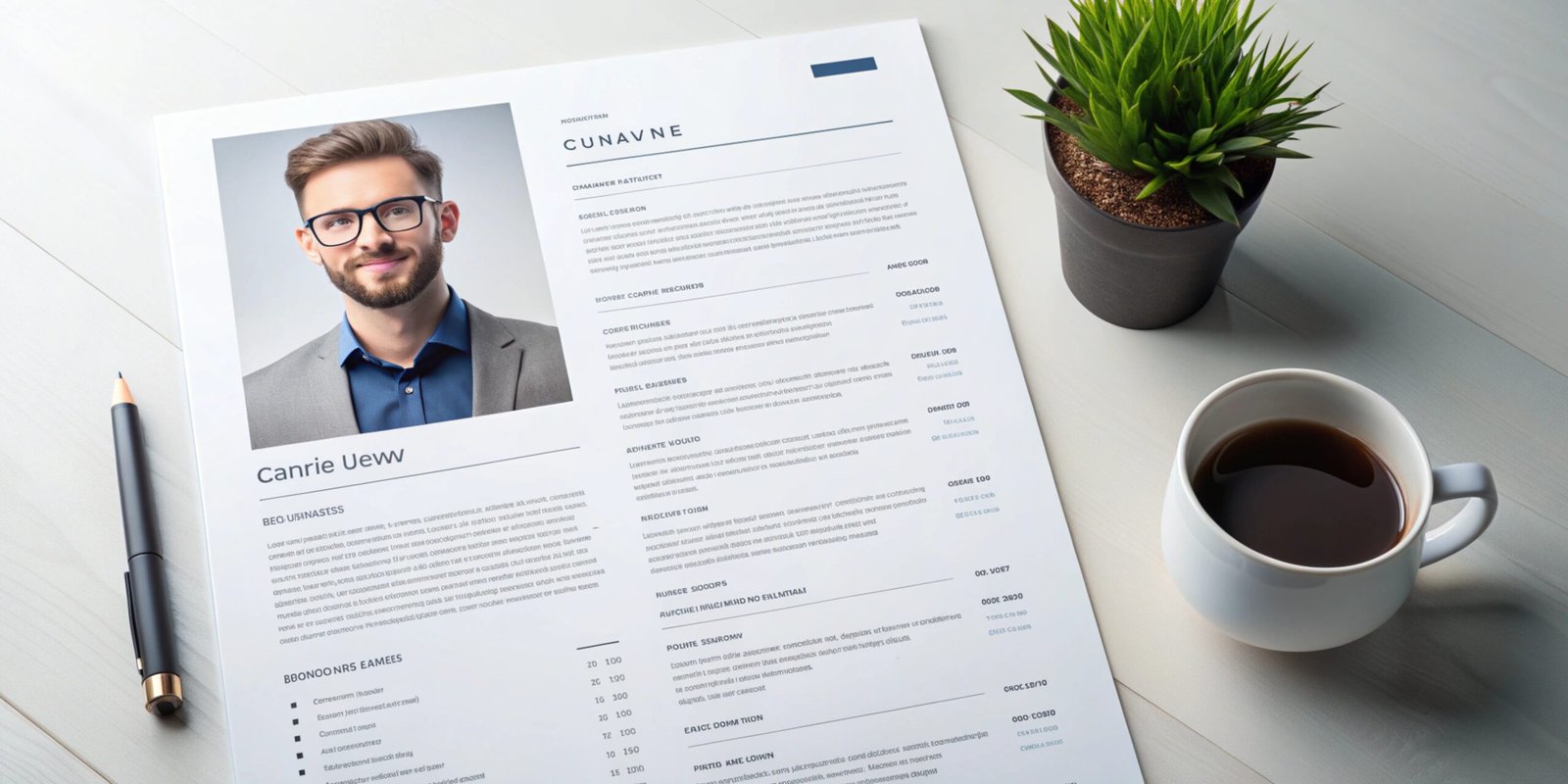Resume & Cover Letter Tips to Impress at Job Fairs
Recruiters often spend mere seconds reviewing each applicant’s materials at job fairs, highlighting the need for impactful resumes and cover letters1. In a competitive job landscape, standing out is paramount. Effective resume and cover letter tips are vital for this distinction. Job fairs present a unique chance to directly connect with potential employers, thus, your application strategy must be impeccable.
For those navigating the intricate job search landscape, ensuring your application materials are refined and bespoke is crucial. It’s imperative that cover letters remain concise, ideally no longer than one page, and be uniquely tailored to each opportunity to sustain authenticity2. Armed with these strategies, you’ll be well-equipped to make a memorable impression, enhancing your chances at the next job fair. Let’s talk about resume & cover letter tips.

Understanding the Importance of Job Fairs
Job fairs are pivotal in the modern employment landscape, offering a singular platform for job seekers to interact with numerous employers simultaneously. This setting significantly boosts the likelihood of discovering a wide array of career opportunities not typically advertised. It’s a dynamic environment that facilitates direct engagement with potential employers.
At these events, candidates can engage in personal dialogues with recruiters, posing questions and gaining crucial insights into the companies represented. Such interactions enable individuals to make more informed decisions regarding their employment pursuits, tailoring their job search strategies effectively. Moreover, research suggests that pre-fair research on employers by job seekers elevates their chances of making a favorable impression by 30%3.
The job fair environment fosters connections that can lead to job offers and industry connections, crucial for career advancement. It is advisable for candidates to prepare multiple versions of their resume and cover letter tailored to different employers. This approach can significantly increase the likelihood of standing out among competitors by 40%3. Such a proactive stance not only projects professionalism but also demonstrates genuine interest in the specific roles being pursued. In essence, job fairs are indispensable for those aiming to propel their careers forward.
Preparing Your Resume for Job Fairs
A well-structured resume is essential for a memorable impact at job fairs. It’s imperative to ensure your resume is up-to-date and tailored to the job you desire. This means updating your contact details and aligning your experience with the job requirements. Research indicates that candidates who demonstrate deep knowledge about the company and the role they’re applying for tend to stand out to hiring managers4.
Keeping Your Resume Current and Relevant
For optimal success, consider crafting various versions of your resume, each tailored to different skill sets and job goals. Christina MacGill from Pennsylvania State University advocates for this approach at job fairs4. Given the swift pace of job fairs, a concise resume, ideally no longer than a page and a half, facilitates quick scanning by employers4.
Choosing the Right Resume Format
Opting for the appropriate resume format is crucial in professional resume writing. You can choose from chronological, functional, or hybrid formats, depending on your career background and the job you’re aiming for. A chronological resume suits those with a robust work history, whereas a functional resume highlights your skills and relevant expertise. The hybrid format blends both to adapt to diverse roles.
Carry multiple copies of your resume, preferably in a durable folder to keep them flat and easily accessible during the event5. This meticulous planning, coupled with additional documents like cover letters and portfolios, significantly enhances your professional appearance5.
Resume & Cover Letter Tips for Tailoring Content
Candidates who tailor their resumes and cover letters significantly boost their chances of leaving a lasting impression at job fairs. Effective job application advice stresses the importance of delving into the companies attending the fair. This research enables a deeper understanding of their values and expectations, facilitating content alignment.
Customizing your cover letter not only highlights your grasp of the company but also plays a pivotal role in your job search success6. Addressing the hiring manager by name, rather than using generic greetings, signals effort and a personal touch6. A unique opening paragraph can make your cover letter stand out, ensuring it is not easily forgotten6.
When crafting your cover letter, it is crucial to emphasize skills pertinent to the job at hand, demonstrating your suitability6. Incorporating concrete examples of your achievements bolsters your credibility and underscores your suitability for the position6. The strategic use of keywords from the job description can also enhance your visibility to Applicant Tracking Systems (ATS)6.
Concerning format, aim for a concise cover letter—preferably one page with three to four paragraphs, single-spaced for clarity7. The structure should prioritize relevance over chronology, beginning with your most compelling experience or relevant skill7. A professional tone, coupled with meticulous proofreading to eliminate errors, showcases attention to detail and elevates the effectiveness of your application7.
Adopting these strategies, complemented by practical cover letter examples, can significantly enhance your job application strategy8. Engaging with programs like the Mentor Match provides additional support and tailored feedback, aiding candidates in refining their approach further8.
Showcasing Your Personality in Your Cover Letter
A cover letter is a crucial opportunity for candidates to unveil their unique personality. It should not only convey qualifications but also enthusiasm and confidence. In a competitive job landscape, where hiring managers sift through numerous applications, a cover letter that stands out is essential910. By showcasing personality, a candidate can differentiate themselves from others with similar qualifications10.
Integrating personal stories or experiences that highlight motivation can forge a deeper connection with the reader. It showcases the candidate’s alignment with the role9. It is vital to tailor the tone and voice of the cover letter to mirror the company’s culture, creating a favorable impression910. Employing specific keywords and references to the organization humanizes the applicant, potentially increasing the likelihood of an interview invitation10.
Emphasizing personal examples that resonate with the company’s values not only underscores a cultural fit but also strengthens the candidacy9. A cover letter that harmoniously blends tone, personality, and professionalism is more likely to capture attention and secure an interview910.
Proofreading and Editing: Essential Steps
Thorough proofreading is paramount for crafting a refined resume and cover letter. It’s imperative for candidates to eschew mistakes, as a single error can be deemed unacceptable by hiring managers11. Leveraging proofreading tips can markedly elevate your documents, ensuring they are lucid and devoid of grammatical flaws.
Common Pitfalls to Avoid
Many overlook common pitfalls during proofreading, such as the repetition of words and clichés that diminish impact11. To refine your proofreading approach, adhere to the following strategies:
- Read the resume or cover letter line by line, focusing intently on each word.
- Print the documents out to more effectively spot errors.
- Employ editing tools like Grammarly and online grammar checkers to pinpoint issues.
- Take regular breaks during proofreading to maintain focus and clarity.
- Consider reading the documents backward to catch overlooked errors12.
- Engage with a human proofreader, such as an experienced writer or English teacher, for a comprehensive review1112.
Seeking External Feedback
Obtaining external feedback is a crucial step in the proofreading process. Sharing your resume and cover letter with acquaintances or colleagues can unveil fresh insights. It’s advantageous to leverage online tools to evaluate tone, readability, and overall quality13. Experts advocate reviewing your documents post-break, ideally a day later, to unearth any lingering inconsistencies or errors13.
Bringing Extra Copies and Supporting Materials
Preparing for a job fair necessitates the crucial step of bringing extra copies of your resume and other supporting materials. This approach is vital for making a lasting impression, given the multitude of opportunities candidates often face. Having additional documents at the ready can significantly boost your prospects. The importance of high-quality paper and meticulous presentation cannot be overstated. It not only reflects professionalism but also signals a keen attention to detail. Such an impressive presentation can profoundly impact how potential employers perceive your enthusiasm and qualifications during the job application process14.
Importance of Quality Paper and Presentation
Employing quality paper for your resumes and supporting materials is paramount, as it offers a tangible reflection of your professional demeanor. A polished presentation devoid of typos and grammatical errors communicates your commitment to effective communication, a pivotal aspect of job application advice. This meticulous preparation distinguishes you from other candidates, particularly in a competitive job fair setting15.
Include a Portfolio if Applicable
For those in creative fields, a portfolio can be transformative at job fairs. A well-structured portfolio, displaying relevant projects or work samples, enables candidates to exhibit their skills and distinctiveness. It furnishes employers with tangible evidence of your competencies, thereby enriching your job application with real-world examples16.
Researching Companies Attending the Job Fair
Conducting company research before job fairs can dramatically boost your chances of making a lasting impression. A staggering 82% of job seekers prepare by researching employers, ensuring they engage in informed discussions17. This preparation allows candidates to align their interests with the company’s culture and values, enhancing their suitability for the role. Such knowledge also enables them to customize their job application strategies to match the employer’s needs.
It is crucial for job seekers to prepare a list of questions to ask employers, fostering deeper engagement and showcasing genuine interest18. This approach can lead to more meaningful conversations and elevates the candidate’s perception by recruiters. Leveraging company websites and social media platforms provides valuable insights into the organizations participating in the fair. Understanding their mission statements enables candidates to tailor their applications, thereby increasing their relevance and appeal19.
Initiating contact with recruiters via email before the fair can establish a connection, facilitating smoother interactions during the event. Including your resume in these emails demonstrates your proactive approach and simplifies the recruitment process. Moreover, comprehensive company research not only aids in making a memorable first impression but also guides the discussion topics, leading to more productive conversations about the company’s initiatives.
Crafting an Effective Elevator Pitch
An elevator pitch is a concise introduction, lasting 30-60 seconds, that encapsulates one’s skills, experiences, and aspirations2021. It is vital for networking at job fairs, where making a strong first impression is paramount22. Utilizing the STAR Method—Situation, Task, Action, Result—can streamline the pitch, enabling candidates to highlight their distinct qualities20.
Effective elevator pitch tips underscore the need to customize the content for the audience’s interests and requirements. A brief pitch should encapsulate the personal brand, spotlight unique selling points, and anticipate common inquiries20. Ending the pitch with a question can foster a more conversational tone and potentially open avenues for further dialogue.
Rehearsing the elevator pitch is crucial for refining delivery and boosting confidence when presenting to hiring managers21. Candidates should exploit this platform for networking at job fairs, as approximately 70% of all employment opportunities are discovered through such channels20. Awareness of body language, consistent eye contact, and a dynamic energy level will notably enhance the pitch’s impact during face-to-face interactions, including career fairs and networking events21.

In summary, an adeptly crafted elevator pitch can facilitate connections and expand opportunities during networking at job fairs. Engaging pitches that resonate with the audience are more likely to yield beneficial interactions.
Networking Strategies for Job Fairs
At job fairs, networking strategies are paramount, enabling job seekers to establish crucial connections and unearth potential opportunities. Interacting with peers not only cultivates rapport but also unveils diverse job search methodologies. To effectively connect with recruiters, preparation and a congenial approach are essential.
Approaching Fellow Job Seekers
Engaging with other job seekers at fairs can unveil shared experiences and insights. Networking with peers broadens your professional network, offering a more comprehensive view of available opportunities. Participating in discussions and disseminating the latest job search techniques enriches interactions, creating a cooperative atmosphere among candidates.
Connecting with Recruiters
When interacting with recruiters, a positive demeanor is crucial. Direct eye contact and well-prepared pitches can create a lasting impression. It is advisable to carry numerous updated resumes, tailored for various roles, to demonstrate an acute understanding of the employer’s requirements23.
Post-event, sending bespoke thank-you emails to recruiters exhibits interest and proactivity24.
| Strategy | Description | Benefits |
|---|---|---|
| Engage with Peers | Approach fellow job seekers to share insights and experiences | Expands professional circle |
| Prepare Elevator Pitches | Craft a concise pitch under one minute | Maximizes impact in short interactions23 |
| Follow-Up | Send thank-you emails after the fair | Maintains connection and shows genuine interest24 |
Mastering the Follow-Up Process after the Fair
Effective follow-up after a job fair is paramount for distinguishing oneself in a fiercely competitive job market. Sending a follow-up email within 24 hours can significantly enhance job prospects25. This immediate communication ensures you remain vivid in the minds of recruiters, facilitating easier recall of your dialogue26.
Importance of Timely Follow-Up
The significance of timing is paramount; a well-structured follow-up email communicates professionalism25. Following up within a day or two can markedly increase your likelihood of being remembered by recruiters26. It is advisable to leverage specific details from your discussions to personalize your email, making it distinctive for each recruiter you engaged with26.
What to Include in Your Thank-You Emails
Your thank-you emails should be concise and direct to enhance memorability25. It is advantageous to align your skills with the available positions at the organization, illustrating your potential contribution26. Expressing interest in a specific role can also convey your eagerness and dedication to joining the team26.
Design an attention-grabbing subject line referencing the career fair to boost the probability of your email being opened25. Aim to sustain a connection post-fair to demonstrate sustained interest in potential roles26. Engaging with recruiters on platforms like LinkedIn offers additional avenues for follow-up25.
Tips for Dressing for Success at Job Fairs
Proper attire is crucial for making a strong impression at job fairs. The initial encounter with potential employers can significantly sway the hiring outcome, as recruiters often form opinions within mere minutes27. It is imperative for candidates to select attire that matches the industry’s norms28.
In fields like accounting and law, conservative attire, such as suits, is preferred. Conversely, creative industries, including fashion, permit more liberty in one’s sartorial choices28. Dressing a level above the industry’s standard can boost confidence during networking, enhancing one’s presence28. Paying meticulous attention to grooming and hygiene further underscores professionalism27.
- Choose neutral colors or classic patterns to convey professionalism effectively.
- Avoid excessive accessories and logos, which might detract from your presentation29.
- Ensure garments are wrinkle-free and fit impeccably to maintain a polished appearance.
Considering the specific companies, the fair’s location, and the job role sought will guide attire choices29. Wearing professional attire significantly increases the likelihood of receiving interview invitations, highlighting the importance of appropriate dressing29.
Common Mistakes to Avoid at Job Fairs
Job fairs are pivotal for candidates to engage with potential employers, yet, certain pitfalls can undermine success. One critical mistake is appearing unprepared. It’s essential to have extra copies of your resume on hand, as insufficient materials can result in missed opportunities.
Engaging with recruiters effectively is another crucial aspect. Many job seekers fail to initiate meaningful conversations, which can be detrimental to making a lasting impression. Following up post-fair is equally vital; neglecting this step diminishes the likelihood of being remembered. Furthermore, dressing inappropriately can detract from your professional image, undermining the effort invested in other job search aspects. Addressing these potential missteps can significantly boost your chances at a job fair.
To ensure success, thorough preparation and a positive attitude are key. For detailed advice on minimizing resume and cover letter errors, refer to these job search tips. These highlight essential elements for job seekers to concentrate on30.
Source Links
- https://careerengagement.utexas.edu/undergraduate-students/prepare/resumes-cover-letters/ – Resume Help – Texas Career Engagement – UT Austin
- https://careers.lmu.edu/careertools/employmentresources/coverletterguide/ – Cover Letter Guide – Loyola Marymount University
- https://www.linkedin.com/advice/1/how-do-you-tailor-your-resume-cover-letter-different-1f – How do you tailor your resume and cover letter for different employers at a job fair?
- https://www.monster.com/career-advice/article/resume-tips-for-job-fairs – Resume tips for job fair success
- https://www.umf.maine.edu/careers/job-search-tools/how-to-work-a-job-fair/using-your-resume-before-and-at-a-job-fair/ – Using Your Resume Before and At a Job Fair – Career Services – University of Maine at Farmington
- https://www.linkedin.com/pulse/how-tailor-your-cover-letter-step-by-step-e6dcf – How to Tailor Your Cover Letter: Step-By-Step Guide
- https://www.careereducation.columbia.edu/resources/how-and-why-write-great-cover-letter – How and Why to Write a Great Cover Letter
- https://accessola.com/wp-content/uploads/2023/11/Tailoring-your-Resume-and-Cover-letter.pdf – PDF
- https://www.flexjobs.com/blog/post/show-personality-in-a-cover-letter/ – How to Show Personality With Your Cover Letter Tone (And Get an Interview)
- https://www.thebalancemoney.com/how-to-show-your-personality-in-a-cover-letter-4174695 – How to Show Your Personality in a Cover Letter
- https://resume.io/blog/proofreading-your-resume – Proofreading your Resume: 12 Tips
- https://www.flexjobs.com/blog/post/6-ways-to-proofread-your-resume/ – 9 Ways to Proofread Your Resume: Tips and Tricks
- https://www.linkedin.com/advice/0/how-do-you-proofread-edit-your-cover-letter – How do you proofread and edit your cover letter for clarity, tone, and grammar?
- https://novoresume.com/career-blog/supplemental-resume-information – What Supplemental Information Should Your Resume Include?
- https://arstechnica.com/civis/threads/should-i-bring-my-coverletter-and-resume-to-a-job-interview.1183403/ – should I bring my coverletter and resume to a job interview?
- https://sites.coloradocollege.edu/sschanz/files/2020/07/Cover-letter-resume-examples.pdf – Writing-Application-Assignment
- https://www.linkedin.com/advice/3/how-do-you-research-job-fair-employers-align-your-cover – How do you research the job fair employers and align your cover letter with their needs and values?
- https://www.morgan.edu/center-for-career-development/events-and-career-fairs/career-fair-tips – Career Fair Tips
- https://www.umf.maine.edu/careers/job-search-tools/how-to-work-a-job-fair/conduct-research-before-attending-a-career-fair/ – Conduct Research Before Attending a Career Fair – Career Services – University of Maine at Farmington
- https://careerdevelopment.princeton.edu/guides/networking/developing-your-elevator-pitch – Developing Your Elevator Pitch
- https://www.thebalancemoney.com/elevator-speech-examples-and-writing-tips-2061976 – When and How to Use an Elevator Pitch
- https://resumetrick.com/blog/elevator-pitch-examples.html – Elevator Pitch Examples & Advice on Writing for 2024
- https://www.linkedin.com/pulse/navigating-job-fairs-strategies-making-lasting-impression-zmzqc – Navigating Job Fairs: Strategies for Making a Lasting Impression
- https://www.linkedin.com/advice/3/what-top-three-resume-tips-job-fairs-skills-job-search-strategies-wvmhf – What are the top three resume tips for job fairs?
- https://enhancv.com/blog/how-to-send-a-career-fair-follow-up-email/ – How to Send a Career Fair Follow-Up Email [Samples Included]
- https://www.rasmussen.edu/student-experience/college-life/things-to-do-after-attending-career-fair/ – 7 Things You Need to Do After Attending a Career Fair
- https://myusf.usfca.edu/career-services/career-resources/interviews-offers/interviews/dress-for-success – Dress For Success – Career Services
- https://christynoel.com/what-to-wear-to-a-job-fair/ – What to Wear to a Job Fair • Christy Noel
- https://www.monster.com/career-advice/article/how-to-dress-for-job-fairs – What to Wear to a Job Fair: How to Choose a Professional Outfit for a Career Fair
- https://www.flexjobs.com/blog/post/words-phrases-never-include-in-your-cover-letter-v2/ – Cover Letter Mistakes and What to Say Instead







